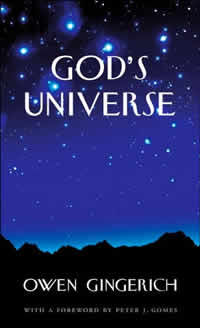Book Notes
 Owen Gingerich, God's Universe (Cambridge: Harvard University Press, 2006), 139pp.
Owen Gingerich, God's Universe (Cambridge: Harvard University Press, 2006), 139pp.
Owen Gingerich (b. 1930), Emeritus Professor of Astronomy and History of Science at Harvard University, was born in Washington, Iowa to a devout Mennonite family. After graduating from Goshen College in Indiana, at age twenty-one he enrolled as a graduate student at Harvard. A leading authority on Johannes Kepler and Nicholas Copernicus, he has an asteroid named in his honor ("2658 Gingerich") and has preached in Washington's National Cathedral. He fondly recalls viewing the rings of Saturn through a simple telescope that his father helped him build from a mailing tube and leftover lenses from a local optometrist.
Gingerich's book contains his three public addresses for Harvard's William Belden Noble Lectures (November 2005), and as Peter Gomes notes in his foreword, they are characterized throughout by their "disarming understatement" and "intellectual modesty." Gingerich argues that science deals with what Aristotle called "efficient causes"—a description of how something happens, but not with "final causes"—an explanation of why something happens. At its best, science adopts a methodological naturalism as a research strategy, and thus remains neutral about metaphysical or philosophical claims outside of its narrow purview. "It is just as wrong," writes Gingerich, "to present evolution in high school classrooms as a final cause as it is to fob off Intelligent Design as a substitute for an efficacious efficient cause."
The cosmos in general and the earth in particular, with their complexity and fine-tuning, are remarkably congenial for humankind to flourish. Nor was humankind—with our complex language, altruism, conscience, creativity, self-consciousness, and abstract reasoning—"necessarily inevitable." It would seem, then, that humankind is an unimaginably lucky and "glorious accident," or perhaps part of a cosmological design or telos. Science can inform one's thinking on the matter, but it cannot, ultimately, determine the answer. For Gingerich, a religious view of the universe makes more sense, explains more, and is more satisfying than a non-theistic view. He admits that this is hardly a proof, just a matter of personal persuasion, what John Polkinghorne likes to call verisimilitude or "the ring of truth."
Gingerich ends his book by quoting the prayer with which Johannes Kepler concluded his The Harmony of the World (1619): "If I have been enticed into brashness by the wonderful beauty of thy works, or if I have loved my own glory among men, while advancing in work destined for thy glory, gently and mercifully pardon me: and finally, deign graciously to cause that these demonstrations may lead to thy glory and to the salvation of souls, and nowhere be an obstacle to that. Amen." Reading this slender volume which culminates a lifetime of dedication to robust Christian faith and rigorous world class science was a privilege that filled me with awe, admiration and gratitude.


